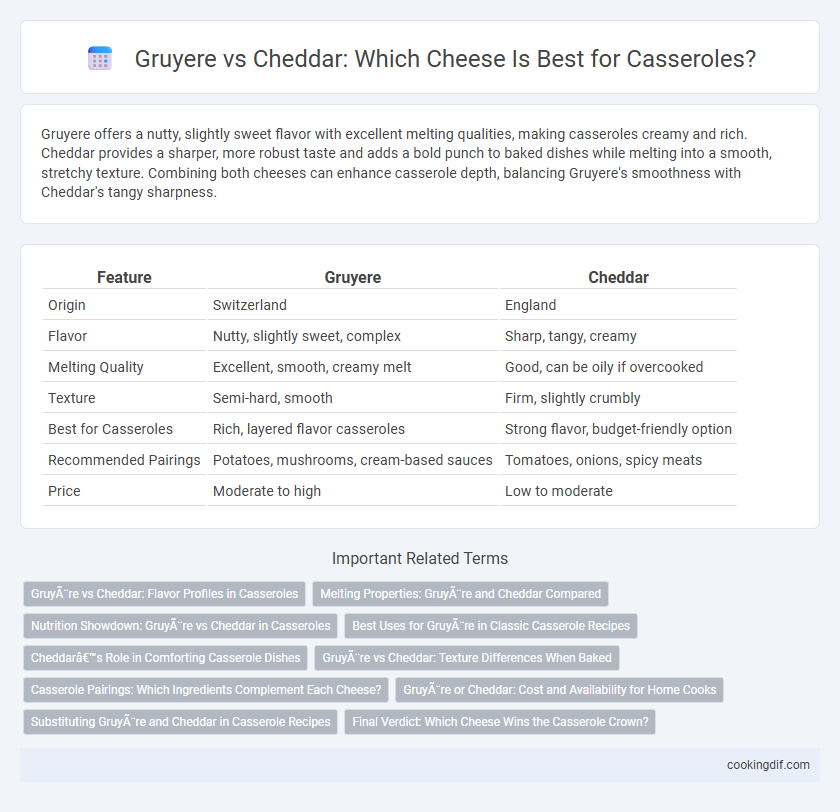Gruyere offers a nutty, slightly sweet flavor with excellent melting qualities, making casseroles creamy and rich. Cheddar provides a sharper, more robust taste and adds a bold punch to baked dishes while melting into a smooth, stretchy texture. Combining both cheeses can enhance casserole depth, balancing Gruyere's smoothness with Cheddar's tangy sharpness.
Table of Comparison
| Feature | Gruyere | Cheddar |
|---|---|---|
| Origin | Switzerland | England |
| Flavor | Nutty, slightly sweet, complex | Sharp, tangy, creamy |
| Melting Quality | Excellent, smooth, creamy melt | Good, can be oily if overcooked |
| Texture | Semi-hard, smooth | Firm, slightly crumbly |
| Best for Casseroles | Rich, layered flavor casseroles | Strong flavor, budget-friendly option |
| Recommended Pairings | Potatoes, mushrooms, cream-based sauces | Tomatoes, onions, spicy meats |
| Price | Moderate to high | Low to moderate |
Gruyère vs Cheddar: Flavor Profiles in Casseroles
Gruyere offers a rich, nutty flavor with a creamy texture that melts smoothly, enhancing casseroles with a sophisticated depth and subtle sweetness. Cheddar provides a sharper, tangier taste and a firmer melt, delivering a bold and robust cheese presence that stands out in hearty casserole dishes. Choosing between Gruyere and Cheddar depends on whether the recipe benefits from a delicate, mellow richness or a pronounced, savory sharpness.
Melting Properties: Gruyère and Cheddar Compared
Gruyere melts smoothly with a creamy, stretchy texture, making it ideal for casseroles that require an even, velvety consistency. Cheddar, especially sharp varieties, tends to separate and become oily when melted, which can affect the dish's texture. Choosing Gruyere over Cheddar enhances the casserole's melt quality, ensuring a more cohesive and luscious cheese layer.
Nutrition Showdown: Gruyère vs Cheddar in Casseroles
Gruyere cheese offers a rich source of calcium and vitamin A with moderate fat content, making it a nutritious choice for casseroles. Cheddar provides higher protein and a stronger flavor profile, along with essential nutrients like phosphorus and vitamin B12. Choosing between Gruyere and Cheddar depends on desired taste and nutritional balance in a casserole recipe.
Best Uses for Gruyère in Classic Casserole Recipes
Gruyere cheese offers a rich, nutty flavor and smooth melting texture that enhances classic casserole recipes such as French onion casserole and potato gratin. Its superior melting properties create a creamy, golden crust that adds depth without overpowering other ingredients. Unlike sharp, tangy cheddar, Gruyere blends seamlessly, providing a balanced taste ideal for traditional casseroles that require subtle cheese integration.
Cheddar’s Role in Comforting Casserole Dishes
Cheddar cheese plays a crucial role in comforting casserole dishes due to its rich, sharp flavor and excellent melting properties that create a creamy, cohesive texture. Unlike Gruyere, Cheddar adds a bold, tangy depth that enhances classic casseroles like macaroni and cheese or broccoli and cheese, elevating their nostalgic appeal. Its versatility and availability make Cheddar a popular choice for home cooks seeking a hearty, satisfying cheese melt in their baked dishes.
Gruyère vs Cheddar: Texture Differences When Baked
Gruyere offers a creamy, smooth texture that melts evenly, creating a rich and luxurious casserole topping, while cheddar tends to become oilier and grainier when baked. The higher moisture content in Gruyere allows it to maintain a soft, elastic consistency, contrasting with cheddar's tendency to separate into clumps or release excess oil under heat. Choosing Gruyere enhances the casserole's texture with a velvety melt, whereas cheddar provides a sharper flavor but firmer, sometimes crumbly, melted cheese experience.
Casserole Pairings: Which Ingredients Complement Each Cheese?
Gruyere enhances casseroles with its nutty, slightly sweet flavor, pairing exceptionally well with ingredients like potatoes, mushrooms, and ham, creating a rich, savory depth. Cheddar offers a sharper, tangy taste that complements classic casserole staples such as broccoli, bacon, and tomatoes, adding boldness and meltability. Choosing Gruyere or Cheddar depends on the desired flavor profile, with Gruyere suited for creamier, milder dishes and Cheddar ideal for robust, hearty casseroles.
Gruyère or Cheddar: Cost and Availability for Home Cooks
Gruyere cheese tends to be more expensive and less readily available in typical grocery stores compared to Cheddar, making Cheddar a more cost-effective and accessible choice for home cooks. Cheddar's widespread availability in various forms and price points fits a range of budgets, while Gruyere often requires specialty stores or online purchase, increasing overall expense and prep time. For casseroles, opting for Cheddar provides budget-friendly convenience without compromising the cheesy flavor essential to the dish.
Substituting Gruyère and Cheddar in Casserole Recipes
Gruyere offers a nutty, slightly sweet flavor that melts smoothly, making it ideal for casseroles requiring a creamy texture. Cheddar provides a sharper, tangier taste and a firmer melt, which adds a robust flavor and a golden crust when baked. Substituting Gruyere with Cheddar can intensify flavor but may alter creaminess, while replacing Cheddar with Gruyere creates a milder, more luscious casserole.
Final Verdict: Which Cheese Wins the Casserole Crown?
Gruyere offers a nutty, creamy texture that melts smoothly, enhancing casseroles with rich, sophisticated flavor, while Cheddar provides a sharper, more robust taste and a firmer melt that adds distinctive tang and bite. For casseroles requiring a luxurious, velvety finish, Gruyere typically outshines Cheddar, making it the preferred choice among gourmet enthusiasts. Cheddar remains a strong contender for those seeking boldness and easy availability, but Gruyere ultimately wins the casserole crown for its superior meltability and complex flavor profile.
Gruyère vs Cheddar for casserole cheese Infographic

 cookingdif.com
cookingdif.com